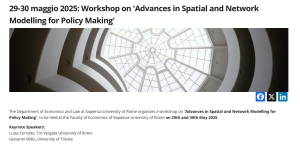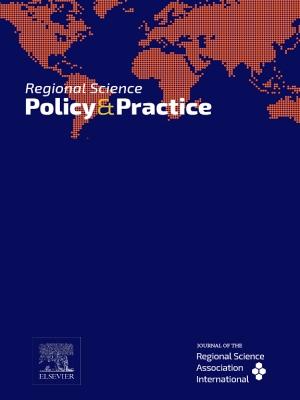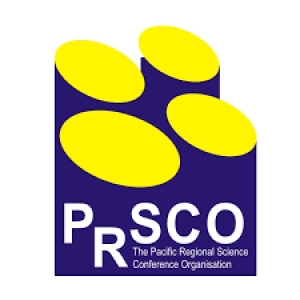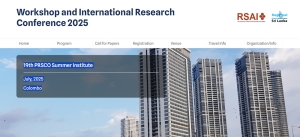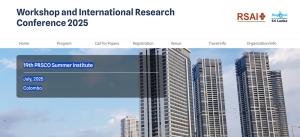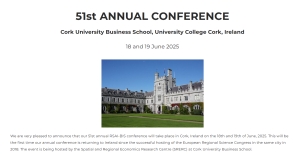RSAI Worldwide
Elisabete Martins
Workshop “Advances in Spatial and Network Modelling for Policy Making”, 29-30 May 2025, Sapienza University of Rome, Italy
The Department of Economics and Law at Sapienza University of Rome organizes a workshop on “Advances in Spatial and Network Modelling for Policy Making”, to be held at the Faculty of Economics of Sapienza University of Rome on 29th and 30th May 2025.
Keynote Speakers:
Luisa Corrado, Tor Vergata University of Rome
Giovanni Millo, University of Trieste
The aim of the workshop is to promote and enhance scientific dialogue among economists, econometricians, and statisticians with a focus on Spatial Econometrics and Statistics. The goal is to investigate the applications of these disciplines across various economic fields that utilize geospatial and relational data, providing valuable insights and strategies for policymakers.
We welcome submissions that cover a wide range of topics in spatial statistics, spatial machine learning, spatial and network econometrics. These can include theoretical developments, methodological innovations, and empirical applications with relevance to both developed and emerging economies.
Two plenary sessions will complement the sessions with the accepted papers.
We are particularly interested in contributions that address, but are not limited to, the following areas:
● evaluation of public policies;
● environmental and health issues;
● regional innovation and technological change;
● demographics, labor markets, and migration;
● global value chains and international trade;
● governance and institutional change;
● inequality, resilience and inclusive growth;
● causal identification of treatment effects;
We invite economists and political scientists working in the field to submit a paper. We especially encourage submissions from junior researchers.
Deadlines Submission of papers: January 31, 2025
Acceptance notification: March 3, 2025
Registration and further information: Extended abstracts (2,000 words) must be submitted by email (This email address is being protected from spambots. You need JavaScript enabled to view it. and This email address is being protected from spambots. You need JavaScript enabled to view it.) in PDF format indicating in the subject the name of the workshop.
Attendance is free for presenters, and it includes coffee breaks, lunches. There will be a charge for the conference dinner on 29 of May.
Organization plan (provisional): n.2 keynote lectures given by Luisa Corrado (Tor Vergata University of Rome) and Giovanni Millo (University of Trieste) and n. 3 thematic sessions.
Scientific and Organizing Committee: Prof. Paolo Di Caro (University of Rome La Sapienza), Prof. Ugo Fratesi (Politecnico di Milano), Prof. Cristiana Fiorelli (University of Rome La Sapienza), Prof. Nicola Pontarollo (University of Brescia), Prof. Valerio Leone Sciabolazza (University of Rome La Sapienza), Prof. Carolina Serpieri (University of Rome La Sapienza)
New Issue: Regional Science Policy & Practice | Volume 17, Issue 1, January 2025
|
|
Editorial
|
Articles
|
|
|
|
|
Book Review
|
Call for Applications | Higano Award for Outstanding Service to PRSCO 2025
Call for Applications, Higano Award for Outstanding Service to PRSCO 2025.
We are pleased to announce that we are now accepting applications for the Higano Award for Outstanding Service to PRSCO 2025 ( the Higano Award).
Please submit your nomination along with the nomination form to the PRSCO Secretariat by February 15, 2025 via email <This email address is being protected from spambots. You need JavaScript enabled to view it.>.
For more information on this award, please see (PDF).
The Pacific Regional Science Council Organization (PRSCO) annually presents the Higano Award for outstanding contributions to PRSCO. The award recognizes a member or friend of PRSCO ( individual person) who has made an outstanding long-term contribution to the development and organization of regional science, particularly in the Asia-Pacific region and internationally beyond the regional level, and may be presented to up to two individuals each year on a calendar year basis. The recipient will be presented with the award by the PRSCO President or his/her nominee at the PRSCO 2025 in Colombo.
More information: http://www.lst.hokkai-s-u.ac.jp/~soushi-s/prsco/PRSCOAwards.html#HA
Call for Submissions | PRSCO Award for Best Paper by a Young Regional Scientist 2025
Call for Submissions, PRSCO Award for Best Paper by a Young Regional Scientist 2025.
The Pacific Regional Science Conference Organization (PRSCO) offers a Best Paper Award annually. The Award is aimed at encouraging young regional scientists within the Asia-Pacific region to participate in research within the PRSCO community and to achieve research excellence. PRSCO now invites submissions for the 2025 Award.
The Award will be made for the best submission to the PRSCO Best Paper competition by a young regional scientist, under the age of 35 (on December 31, 2025), who is from a PRSCO-relevant part of the world.
The Award rules can be found on the PRSCO web site.
Papers submitted for the Best Paper Award should be presented to the 19th PRSCO Summer Institute in 2025 at Colombo on July 24-25, 2025.
The LOC of the PRSCO 2025 will waive the registration fee for the Prize winner.
Eligible authors who wish to submit a paper to the PRSCO Best Paper competition should email a pdf copy of their paper to the PRSCO Executive Secretary, Soushi Suzuki, This email address is being protected from spambots. You need JavaScript enabled to view it., by no later than May 31, 2025.
Papers will be assessed by a PRSCO Best Paper Selection Committee and the author of the winning paper is expected to be notified by July 10, 2025. The decision of the Selection Committee will be final.
More information: http://www.lst.hokkai-s-u.ac.jp/~soushi-s/prsco/PRSCOAwards.html#Young
Call for Abstracts | 19th PRSCO Summer Institute in 2025. Renuka City Hotel, Colombo, Sri Lanka, July 24–25, 2025
Call for Abstracts, The 19th PRSCO Summer Institute in 2025.
Renuka City Hotel, Colombo, Sri Lanka, July 24–25, 2025.
Key dates
December 1, 2024: Abstract submission opening
March 31, 2025: Abstract submission deadline
April 30, 2025: Notification of abstract acceptance
May 1, 2025: Early bird registration open
May 31, 2025: Early bird registration end
July 24 and 25, 2025: Conference
More information: https://regionalsciencesl.lk/
Call for Abstracts | 51st RSAI-BIS Conference, 18-19 June 2025, Cork, Ireland
Annual Conference 2025 Call for Abstracts
The call for abstracts for the 51st Regional Science Association International - British and Irish Section (RSAI-BIS) in Cork in June 2025 is now open. There is also further information on the conference and venue, including key dates, travel, and accommodation, available here.
The conference will take place on June 18 and 19, 2025 and being hosted by the Spatial and Regional Economics Research Centre at Cork University Business School.
The deadline for abstract submissions is February 28, 2025.
We hope you will join us in Cork for a stimulating and fun conference.
Early Career and PhD Colloquium
The Section's annual early career and PhD colloquium has again proved very attractive and over 25 papers will be presented at the online event on January 23 and 24, 2025.
We welcome all researchers to attend virtually and provide feedback on the papers. If you would like to receive log on details for the sessions, please email the colloquium organiser, Daragh O'Leary (This email address is being protected from spambots. You need JavaScript enabled to view it.). More information on the event is available here.
New issue of the Romanian Journal of Regional Science, Vol.18, No.2, Winter, Issued December 2024 now available!
Vol.18, No.2, Winter, Issued December 2024
All articles are downloadable
A mathematical model for population distribution II: Linear systems ● pp. 1-34
by Nicholas Elias, Democritus University of Thrace, Greece
Lagging regions in the U.S. are thriving in the post-COVID-19 era: Nice but why? ● pp. 35-44
by Amitrajeet A. Batabyal, Rochester Institute of Technology, United States
by Barbara Martini, University of Rome Tor Vergata, Italy
BOOK REVIEW
Ugo Fratesi, Regional Policy: Theory and Practice, Routledge, 2023 ● pp. 61-64
by Silvia Cerisola, Politecnico di Milano, Italy
Two vacancies for postdocs at the Joint Research Centre of the European Commission
Job opportunity description
Quantitative Policy Analyst on Indicator Frameworks
The current vacancy is with the Unit “Science for Modelling, Monitoring and Evaluation” of the Directorate for Innovation in Science and Policymaking.
The unit's activities help informing the conception, development and implementation of EU policies at national and local levels thanks to sound quantitative evidence and insights provided by statistical and econometric analysis, modelling solutions and monitoring frameworks based on composite indicators and scoreboards.
We offer two positions as Quantitative Policy Analysts in the Unit, and in particular in the team “Competence Centre on Composite Indicators and Scoreboards (CC-COIN),” to work on projects related to using data for constructing composite indicators and scoreboards, monitoring multidimensional phenomena and understanding their drivers and policy implications. We work on projects with high policy relevance, within a multidisciplinary team and a friendly, stimulating and efficient working environment, with strong emphasis on inclusiveness, diversity, collaboration and teamwork.
For further information, please consult the vacancy notice.
Postdoctoral Researcher in Sustainability Economics, ETH Zurich, Switzerland
Postdoctoral Researcher in Sustainability Economics
The Sustainability Economics Group, led by Prof. Dr. Moritz Drupp, seeks to inform and support the transition to sustainable futures. We investigate how society can manage natural and human-made resources not only efficiently but also equitably. Research foci in the group include (i) studying the efficacy and distributional effects of environmental policies, (ii) exploring concepts of intergenerational justice, such as applied to estimating the social cost of carbon, (iii) analysing preferences and sustainability-relevant behaviours, and (iv) accounting for the limited substitutability of nature when measuring and managing sustainable development. We draw on a diversity of methods (theory, modelling, surveys, experiments, quasi-experimental designs), often in international, interdisciplinary and transdisciplinary cooperation, and publish our work in general economics journals (e.g. American Economic Journal: Economic Policy, Journal of Economic Literature), field journals (e.g. JEEM), and interdisciplinary journals (e.g. Nature Climate Change, PNAS, Science). With our teaching, we seek to stir students’ enthusiasm for the possibilities in which economic theories and empirical methods can help to better understand and manage sustainability challenges. We furthermore actively contribute to the societal debate and help to improve public policy.
- Institution: ETH Zurich, Switzerland
- Details: Postdoc at ETH Zurich
Assistant Professor in Development Economics, Wageningen University
Assistant Professor in Development Economics
The Development Economics group at Wageningen University & Research invites applications for an Assistant Professor in development economics, beginning in July 2025 (or a later agreed upon date). We seek an enthusiastic and high-quality colleague, with expertise in empirical and/or theoretical development economics, to complement our team.
As Assistant Professor, you will be expected to:
- develop and implement research projects and publish in top (field) journals in economics;
- develop and teach courses, in collaboration with colleagues, and supervise PhD students and BSc and MSc theses;
- acquire funding to realize your research agenda;
- contribute to a lively, friendly, and inclusive working and learning environment.
- Institution: Wageningen University (WUR), Netherlands
- Details: Assistant Professor at WUR
About Us
The Regional Science Association International (RSAI), founded in 1954, is an international community of scholars interested in the regional impacts of national or global processes of economic and social change.

